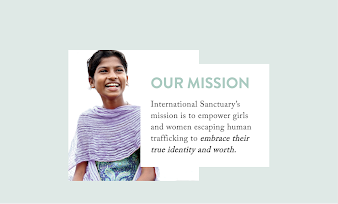Understanding Human Trafficking in Our Community and Around the World
The state of California has the highest number of reported human trafficking cases annually in the United States.
As someone who has lived in California my entire life, I feel appalled, terrified, and in shame that I was completely unaware of how prevalent human trafficking is in my own community and around the world.
On March 10, 2021 I was able to attend the GIP panel discussion, "Understanding Human Trafficking in our Community and Around the World," moderated by Global Scholar, Sarah R. The lineup of professionals included Alexandra Badie (Marketing & Communications Manager of International Sanctuary), Brandon Cox (Executive Director of Oasis Refuge), and Sgt. Jeffrey Walker (Trafficking Team of the Los Angeles Regional Human Trafficking Taskforce Special Victims Bureau).
To begin the panel, the speakers defined human trafficking as "the forced labor of anyone for any reason." They also provided a thorough explanation to why the fight against human trafficking is so urgent. Ms. Badie highlighted the International Sanctuary's current plans and projects, including opening up sanctuaries in the Philippines, Uganda, India, and the US. The sanctuary focuses on providing rehabilitation for victims, through aftercare, support, and providing women with the tools they need to get jobs and take care of their families. In India, poverty goes hand-in-hand with the trafficking problem as families are forced to sell their children into slavery if they cannot afford to pay for rent, housing, and bare necessities.
The sanctuary also plans to open up rehabilitation centers in Mexico, where education is a huge barrier for victims of trafficking. What really shocked me was hearing about how a number of trafficking victims lose the ability to perform everyday functions like splitting checks and counting money. With the help of these organizations, victims throughout the world can seek the care they need to move forward. Mr. Cox continued the discussion by sharing his work with the Oasis Refuge in providing rehabilitation for victims, especially teenage victims. These stories and useful pieces of information touched me because human trafficking thrives off of desperation and feeds on the most vulnerable people.To wrap up the presentation, the panelists described how COVID-19 fits into the picture of human trafficking. During the pandemic, the numbers have exponentially increased because children spend hours online away from their friends to keep them comfort. Since human trafficking is heavily relationship based, victims are coerced into trusting their abusers and it can make them think that they are apart of a family.
Overall, human trafficking is a devastating issue and not enough is being done about it. Victims do not want to come forward about their abuse because it is traumatic and can make them feel shameful, but it is important to acknowledge how human trafficking affects your community because it really is everywhere.
Luckily, the panelists provided lots of helpful tips on how to join the fight against human trafficking. The first step is to become aware and understand how big of a problem it is. They also provided a national trafficking hotline, 888-373-7888, and referenced the Polaris website as one of the best sources out there to educate yourself on human trafficking. This was an incredible opportunity to hear about the dangers of human trafficking and having these discussions are the first steps we can take as a community to solve this pressing issue.
Aleen



Comments
Post a Comment